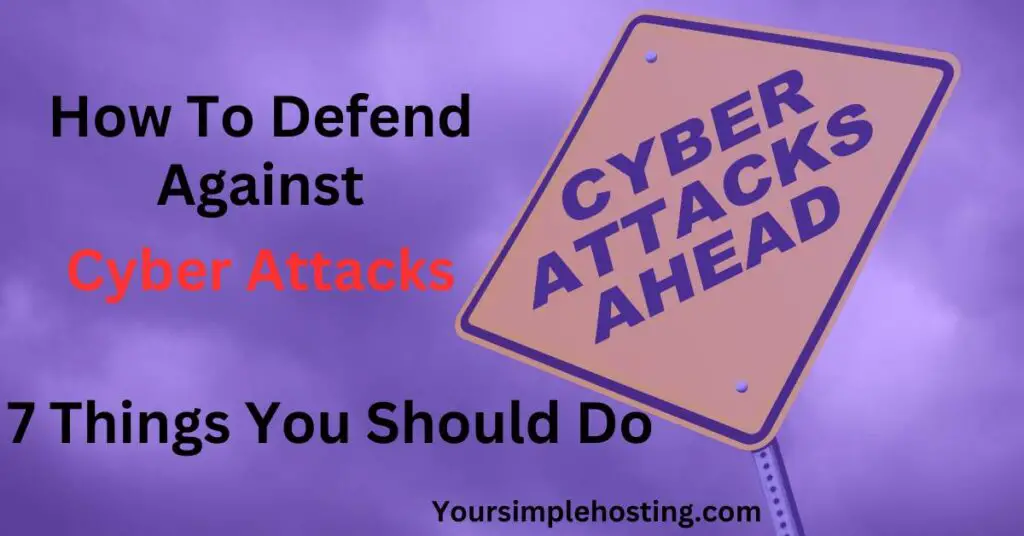Cybercriminals adapt their techniques for data theft and online destruction alongside the rapid development of new technologies. As a result, cyber attacks provide a persistent and ever-evolving threat, from ransomware to identity theft.
Because of this, knowing how to protect yourself and your loved ones from harm is more crucial than ever.
You can defend yourself against cyber attacks in various ways. Some include safe online gaming, wise usage of banking software, antivirus software, strong passwords, not clicking on links in emails, and using a VPN.
This article will discuss these ways in detail to stay protected from cyber attacks. This article will be helpful for everyone concerned about online security, whether they are business owners, parents, or students.
Let’s get started!

Table of Contents
List of 7 Things to Defend Yourself From Cyber Attacks
Here’s the list of 7 things/steps you must take to save yourself from cyber attacks:
1. Be Cautious When Using Public WiFi
Public WiFi networks, such as those in coffee shops and airports, are often unsecured and can leave you vulnerable to cyber attacks.
To protect yourself, always be cautious when using public WiFi and avoid accessing sensitive information, such as your bank account or email, while connected to these networks. You can also do the following things to protect your data when using public WiFi:
- Use websites that support HTTPS
- Turn off file sharing
- Using two-factor authentication
- Use a VPN
2. Install VPN Applications
A VPN application is one of the best ways to protect yourself from cyber attacks. A VPN encrypts your internet traffic and hides your IP address, making it difficult for hackers to intercept your data. VPN not only helps you with security but with privacy too. Having one is always a great idea.
Choosing the best VPN can be a difficult task. You should always check if the VPN providers provide a free trial to test it out before actually considering it.
Best VPN Applications to Install
Numerous VPN applications are available on the market, and choosing the best one for you can depend on your specific needs. Here are some popular VPN applications that are known for their reliability and security:
- Express VPN
- Cyber Ghost
- IP Vanish VPN
- Nord VPN
- Surf Shark
3. Use Antivirus Software
Antivirus software protects computers from, finds, and removes viruses. A computer virus is a program that copies itself by changing other programs and adding its code to them.
Once the code is installed, the virus can “spread” to other files and computers.
Common types of computer viruses
- Trojan Horse
- Viruses
- Spyware
- Adware
- Ransomware
Everyone should make sure that their computers have an antivirus program installed.
Common file types infected by computer viruses
- Executables
- PDFs
- Word documents
- Excel documents
- Image files
- Scripts
These file types are the most commonly used to spread computer viruses.
Installing antivirus software on your computer and mobile devices will protect important files and data from getting stolen or misplaced.
How To Install Antivirus Software?
To install antivirus software on your device, you have to follow the steps listed below:
- First, choose a software that suits your needs.
- Then, download the installer from the software’s official website.
- Run the installer and follow the prompts to complete the installation.
- Activate the software using the license key or activation code you received.
- Configure the settings to your preferences and keep the software up to date by checking for updates. It’s that easy!
4. Stay Safe While Gaming Online
Thanks to high-speed internet, online gaming has become easily accessible, offering various games, such as car racing, Sudoku, and more. However, it’s crucial to be cautious of the risks involved.
These games may contain online predators, spyware, malware, or malicious individuals who might attempt to coax you into sharing sensitive information. Therefore, practicing online safety is crucial to mitigating these risks.
Security Guidelines for Online Gaming
Here are some gaming-oriented security guidelines to follow:
- Identify administrator mode risks, as most games require admin mode. This ensures that the downloaded game is safe and authentic.
- Pay attention to firewall management. Home users can protect their devices by enabling the firewall to filter what is being accessed.
- Play the game on its original site to avoid malicious websites and ads.
5. Be Careful While Using Banking Apps
Many security flaws have been flagged ever since online banking became commonplace. Malware attacks are one type of security concern you should be aware of. Malware is malicious code designed to harm a computer system.
Cybercriminals often write the coding for these dangerous apps. The program can steal passwords and other login information. Possible components include phony account signups and logins.
The following are some guidelines for conducting Internet banking securely:
- The first step is to assess the online banking policies of the financial institution regularly.
- To log in, you must utilize a string of increasingly complicated characters for your password. Change your Password or PIN regularly. Avoid using obvious numbers and words in your password, such as your birth year or name.
- There needs to be protection for your PC.
- You should make more use of your credit cards. It’s safer to use a credit card than a debit card. Credit card companies officer more protection against fraud.
- Don’t log in to your accounts when you’re out in public. There is a high potential for people to see the login details, and public networks that don’t cost anything are an example.
- Sometimes verify your current balance.
- Be sure to check your bank’s correspondence via email regularly.
- Contact the bank immediately if you feel an intrusion has occurred.
6. Take a Computer Security Service Subscription
A computer security service subscription can help you defend against cyber attacks. These services typically offer a range of tools and features designed to protect your devices and data from cyber threats.
For example, they may include antivirus and anti-malware software, firewalls, intrusion detection and prevention, and identity and access management tools.
Additionally, many security service providers offer regular security updates and patches to address known vulnerabilities and keep your devices up-to-date. By subscribing to a reputable computer security service, you can have peace of mind knowing that you have expert assistance and support to help protect you against cyber attacks.
7. Make Sure to use Firewalls
Firewalls can help you fight against cyber attacks by acting as a barrier between your device and the internet. A firewall is a network security device that monitors and controls incoming and outgoing traffic based on predefined security rules.
It can prevent unauthorized access to your device and network and protect against malware and other cyber threats.
Here are some ways that firewalls can help you fight against cyber attacks:
- Block unauthorized access: Firewalls can block unauthorized access to your device or network by monitoring incoming traffic and only allowing traffic that meets specific criteria. This helps prevent hackers and other cyber criminals from accessing your sensitive data.
- Filter incoming traffic: Firewalls can filter incoming traffic based on the type of traffic, its source, and its destination. This allows you to block traffic from known malicious sources and prevent attacks that exploit known vulnerabilities.
- Control outgoing traffic: Firewalls can also control outgoing traffic, preventing malware or unauthorized applications from communicating with remote servers. This can help prevent data exfiltration and attacks that rely on outbound connections.
- Monitor network activity: Firewalls can provide real-time visibility into your network traffic, allowing you to detect and respond to potential threats quickly.
Using a firewall can add an additional layer of protection to your device and network, making it more difficult for cyber attackers to breach your security defenses.
How To Install Firewall?
Installing a firewall on your device is a straightforward process:
- Identify which firewall software is appropriate for your device and download it from a reputable source.
- Run the installation file and follow the prompts to install the software on your device.
- Once the installation is complete, configure the firewall to your preferences. You can customize the rules to control incoming and outgoing traffic.
- Ensure that the firewall is enabled and running correctly.
Conclusion
Defending against cyber attacks is a crucial aspect of modern-day living, and there are several steps you can take to protect yourself. By following the seven tips outlined in this article, you can significantly reduce your risk of falling victim to cybercrime.
Remember, prevention is always better than cure, and investing time and effort in securing your devices and data can save you a lot of trouble and heartache down the line. So stay vigilant, stay informed, and stay safe in the digital age!

Leave a Reply